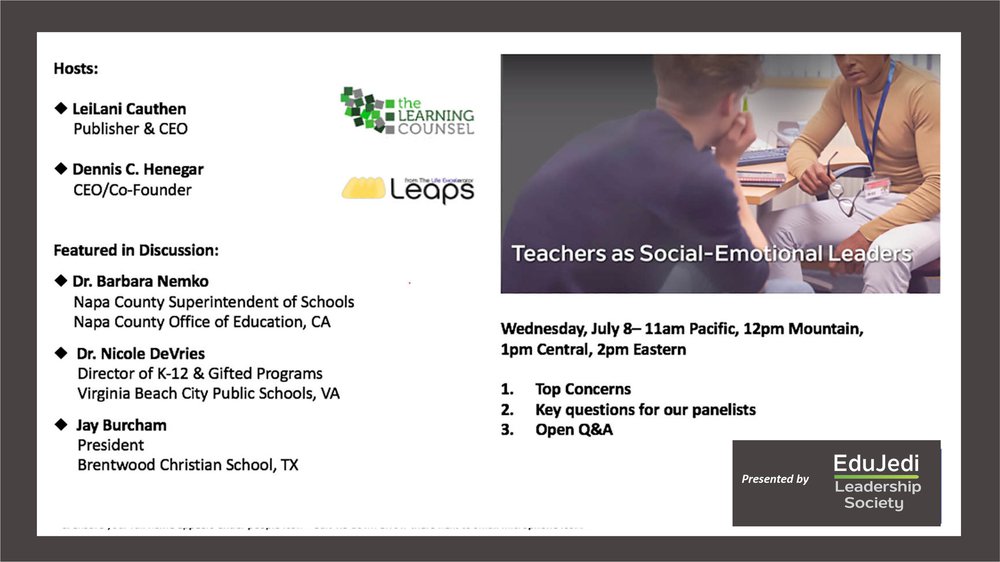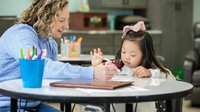These are unusual times. The stress that the pandemic has caused is being felt by everyone, especially our students who are trying to deal with an unprecedented situation. In this episode of the Learning Counsel’s Back to (e)School Tactics Discussion series, some of the nation’s school and district leaders tackle the tough discussion of preparing our teachers to be social emotional leaders.
According to LeiLani Cauthen, CEO and Publisher at the Learning Counsel, “We have another surge of the Coronavirus, and we're in the middle of the perfect storm of everything. What has emerged as one of the most important things to discuss is the fact that there's a social emotional issue that's going to be hitting teachers more than ever going into the fall. So, we're trying to make sure schools are prepared for what that means for their teachers, because individual teachers are the frontline for helping calm some of those nerves. In reality, we're dealing right now with a mental health crisis. So, how can we help people lead? How can the teachers not only get in their own right mindset, but survive? What's this avalanche coming at them as they try to head back into fall identifying what is needed, having the right supports. For example, where's the line in remote learning? We've been hearing a lot of stories about teachers getting late night calls from kids in distress. Where's the line? How do you lead?”
Dennis Henegar is the Founder and CEO for Leaps, The Life Excelerator. Henegar said, “We absolutely see teachers as the key to addressing these issues. And I personally believe that there is nothing more important for our schools to do than addressing mental health, SEL and everything that goes with it. And teachers are going to be the key. We want every teacher to be a hero to their students. Someone that these students will remember. There's an old saying that says, I don't care how much you know until I know how much you care. Talking about life with their students is a great start for building relationship and trust.”
Jay Burcham, President of the Brentwood Christian School in Texas said, “One of the big things that is a hot national topic right now is mental health in schools, but we have a bit of a conflation between true mental illness and actual mental health. And one of the things that we focus on, for example at Brentwood, is the actual social and emotional development of our students, as that pertains to their psychosocial capacity. And what that means is their ability to integrate into and have success within social familial educational settings at age level. And that's one of the big things that actually has once again, become somewhat conflated because of the quick advent of quick information, the ability of that quick information to grow our kids up in some ways, intellectually faster than they're growing socially. And the one thing I would put out there, and this is a great moniker or for educators to think about it. 20 years ago, we measured intelligence as 90% intellectual capacity, 10% social capacity. When now, we actually do a 50/50 modeling, which says intellectual capacity is equal to their social quotient. And that social quotient is that adaptive ability within the home, within school, within friendships. And that adaptive ability is something that has to be taught. Adaptability is the ability to integrate into those situations and you have the conflation of social media online, all those things that are pulling in different directions than actual societal values.
“And then when you have broken homes on top of that, what you end up with is putting our teachers in the position of having to be the social quotient educator, along with the intellectual quotient educator. And if you can't do both of those, then you end up in a situation where you're spending 80 percent of your time on 20 percent of your students, those who have the deficits. And so, we begin defining that as mental health issues, where in actuality, it's their psychosocial capacity for integration into and success within those measured areas for which we define normalcy and we define expectations.”
According to Dr. Barbara Nemko, Napa County Superintendent of Schools at the Napa County Office of Education, “We need to get kids back into school. They need that social and emotional component of school, but then you hear the (COVID-19) cases arising. So they may say, well, it's going to be safe if we get them back into school. And so everybody is in a state of high anxiety, and I think that talking has to be the first thing that we do, giving people a chance to express their fears, express themselves. Then we can get to the details of either what we want to teach or how we want to teach it. Second thing is we tossed teachers into remote learning over a weekend. We were in school on Friday and closed on Monday, and suddenly teachers were being asked to do something that they had varying degrees of skill in doing. And it was harder to do the professional development because again, we had to do it remotely.”
Dr.Nicole DeVries, Director of K-12 and Gifted Programs at Virginia Beach City Public Schools said, “One of the things that we're constantly engaging our discussion around in our school division is that this is the most stressful times that teachers have ever lived through. And so how do we reconcile the teachers' emotional wellbeing along with students, because we know that if the teachers are not in a good space, then they're not equipped to help students who may or may not be in a good space when we enter whatever our structure may look like in the fall.”
Watch the video
Whether good or bad, teachers are compelled to take on the mantle of social emotional leaders as schools begin this Fall. You’ll want to watch this discussion, as these school and district leaders explore the many challenges of equipping their teachers to take the lead in the social emotional instruction for their students.











